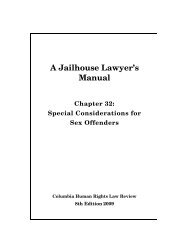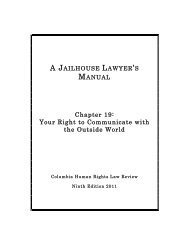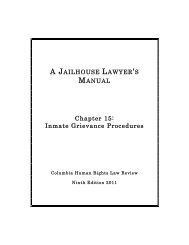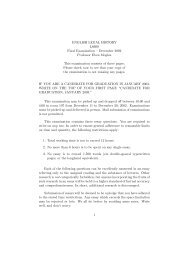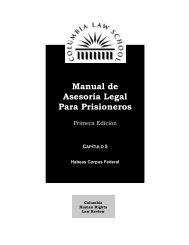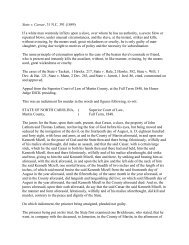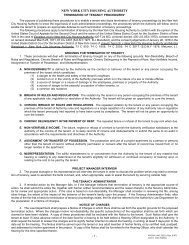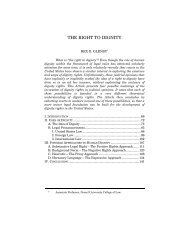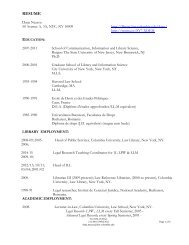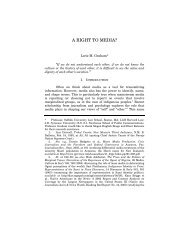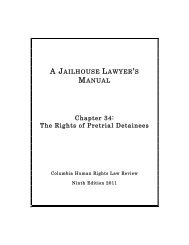CHAPTER 33 - Columbia Law School
CHAPTER 33 - Columbia Law School
CHAPTER 33 - Columbia Law School
Create successful ePaper yourself
Turn your PDF publications into a flip-book with our unique Google optimized e-Paper software.
Ch. <strong>33</strong> TEMPORARY RELEASE PROGRAMS 897<br />
found employment within six weeks after orientation, you may be removed from the program if the<br />
TRC decides you are unwilling or unable to secure a job. 30<br />
5. Family Reunion Program<br />
If you do not qualify for either the leave of absence for funeral/deathbed visits, or the furlough<br />
family-ties programs, you may still have another chance to visit with your family. The Family<br />
Reunion Program allows selected prisoners and their families to meet privately for an extended<br />
period of time. 31 This program has nothing to do with the Temporary Release program. Rather, it is<br />
part of visitation and is only available to those prisoners who are not eligible for the temporary<br />
release program. Any prisoner may apply if his facility offers the program. 32 The rules state that to<br />
be eligible, the prisoner:<br />
(1) Must have been in the department’s custody for at least ninety days, and be a resident<br />
for at least thirty days of a facility that offers the program; <strong>33</strong> and<br />
(2) Must have shown a pattern of good institutional adjustment and have not recently had<br />
any major disciplinary problems, nor an extended history of disciplinary problems. 34<br />
The prisoner must also maintain satisfactory behavior throughout the application and the visit. 35<br />
Further, a prisoner is not eligible for the Family Reunion Program if he:<br />
(1) Is eligible for the Temporary Release Program, unless the prisoner’s application for<br />
temporary release has been denied;<br />
(2) Has a higher security designation than permitted at the program site;<br />
(3) Is assigned to a special housing unit for disciplinary reasons; or<br />
(4) Has violated the Family Reunion Program rules within the past ninety days. 36<br />
Applicants who have violated Family Reunion Program rules in the past must be approved and<br />
reviewed by the Central Office. 37 For more information about which family members may<br />
participate in the program, the procedures for applying, and the instructions for conducting the visit,<br />
please see N.Y. Comp. Codes R. & Regs. title 7, section 220.<br />
C. Eligibility Requirements for Temporary Release Programs<br />
If you have ever been convicted of any of the following offenses, you are not eligible for<br />
temporary release:<br />
(1) Escape, first, second, and third degree;<br />
(2) Absconding, first and second degree; and<br />
(3) Absconding from furlough or from a community treatment facility. 38<br />
30. N.Y. Comp. Codes R. & Regs. Tit. 7, § 1903.2(d)(2)(vi) (2001).<br />
31. N.Y. Comp. Codes R. & Regs. Tit. 7, § 220.1 (2001).<br />
32. N.Y. Comp. Codes R. & Regs. Tit. 7, § 220.2 (2001).<br />
<strong>33</strong>. N.Y. Comp. Codes R. & Regs. Tit. 7, § 220.2(a)(1) (2001).<br />
34. N.Y. Comp. Codes R. & Regs. Tit. 7, § 220.2(a)(2) (2001).<br />
35. N.Y. Comp. Codes R. & Regs. Tit. 7, § 220.2(a)(2) (2001).<br />
36. N.Y. Comp. Codes R. & Regs. Tit. 7, §§ 220.2(b)(1)–(4) (2001).<br />
37. N.Y. Comp. Codes R. & Regs. Tit. 7, § 220.2(b)(4) (2001).<br />
38. N.Y. Comp. Codes R. & Regs. Tit. 7, § 1900.4(c)(2)(i) (2001). Absconding refers to failing to report or moving<br />
without informing your Parole Officer.



